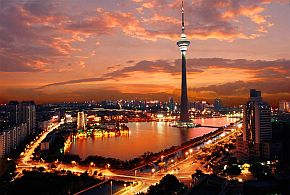Analytics, China, Economics, Markets and Companies, Technology
International Internet Magazine. Baltic States news & analytics
Thursday, 25.04.2024, 12:19
Xinhua Insight: China to re-evaluate development zones
 Print version
Print version |
|---|
"When the country first decided to set up a development zone here, people had doubts about how it would progress and how far it could go," said Xu Hongxing, director of the Tianjin Economic-Technological Development Area (TETD).
Development zones of various kinds have since mushroomed, affecting the economy in a way that far exceeds the expectations of the time. Development zones generated plenty of growth in the past, but now the question arises of whether the policy is still on track.
"Economic zones have achieved a lot. They have played a crucial role in increasing trade, creating jobs, driving growth, and most importantly, connecting China with the rest of the world," said Chen Qining, president of the China headquarters of Singapore SCP Consultants Private Ltd., a city and regional planning consultancy.
The TETD, currently the most competitive economic zone, was one of the first approved in 1984, to expand reform and opening-up.
By July this year, there were 215 economic and technological zones, 115 high-tech zones, 13 tariff-free zones, 63 export processing zones, 15 border zones, and 57 zones of other types. In addition to these national zones, there were 1,170 provincial zones, and numerous economic zones at the prefecture or county level.
Wang Jici from the urban and environmental science college at Peking University, described how development zones were created when the country thirsted for capital, talent and technology. "They pushed opening up and technological innovation and have become a label for the China model," he said.
One fifth of gross foreign investment has gone into 210 national economic and technological development zones which contributed one eighth of GDP in 2013.
"It is quite a complicated picture if you look at the development of economic zones. There were problems like low efficiency, over-exploitation of resources, environmental pollution, and corruption," Wang said.
Of 171 state-level economic zones in 2012, a large proportion reported less than 50 billion yuan (8.14 billion U.S. dollars) in GDP and no more than 20 billion yuan in exports, while the ratio of service industries for most zones was lower than 30%.
Preferential policies regarding investment, tax, trade, quotas, customs, labor regulations and land are there to attract investment. Under the control of governments, the zones have often become hotbeds of corruption. Between 2000 and 2014, more than 200 officials working in development zones in central Hubei Province were removed from office.
Local officials obsessed with GDP are also inclined to tolerate high polluting industries. Residents near an industrial park in east Shandong Province have been filing complaints about serious pollution since 2009.
"Development zones were designed to accomplish different missions. Some apparently failed, but local governments still kept them because they want favorable policies," said Zhao Min, a professor from the architecture and urban planning college of Tongji University.
Well aware of the issues, Deputy Premier Wang Yang said at a meeting earlier this month that development zones should be transformed from growth-oriented to quality-oriented, from government-dominated to market-driven, from homogeneous competition to differentiated development, and the soft environment improved to make them more attractive.
"The government will strengthen macro-guidance and dynamic management, downgrading or weeding out those zones that are inefficient in land use or backward in development, and fail to meet environmental standards," the deputy premier said.
To achieve this, Chen Qining believed the key issue is whether the government can shift its role from that of operator to regulator, otherwise it will be impossible to eradicate corruption and improve efficiency.
Predicting that development zones will continue as growth drivers for some time, Zhao said Min that an evaluation mechanism would help make the right decisions.
"What we need now is not more zones, but to improve the existing ones. There is no need for more preferential policies, but there is a need to extend the industrial chains for those zones, promote their functions and integrate them with cities," Zhao said.
Xinhua








 «The Baltic Course» Is Sold and Stays in Business!
«The Baltic Course» Is Sold and Stays in Business!

